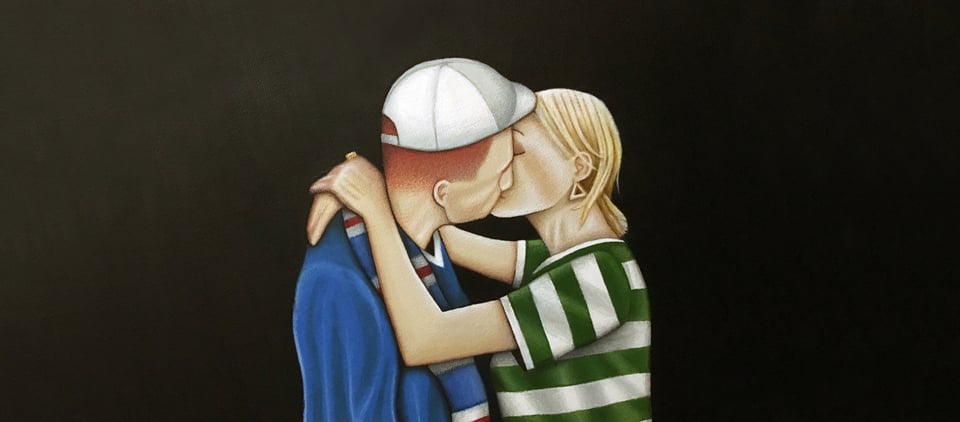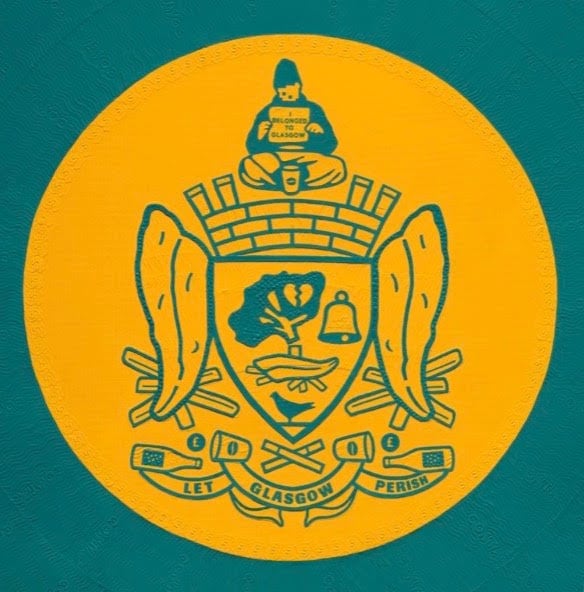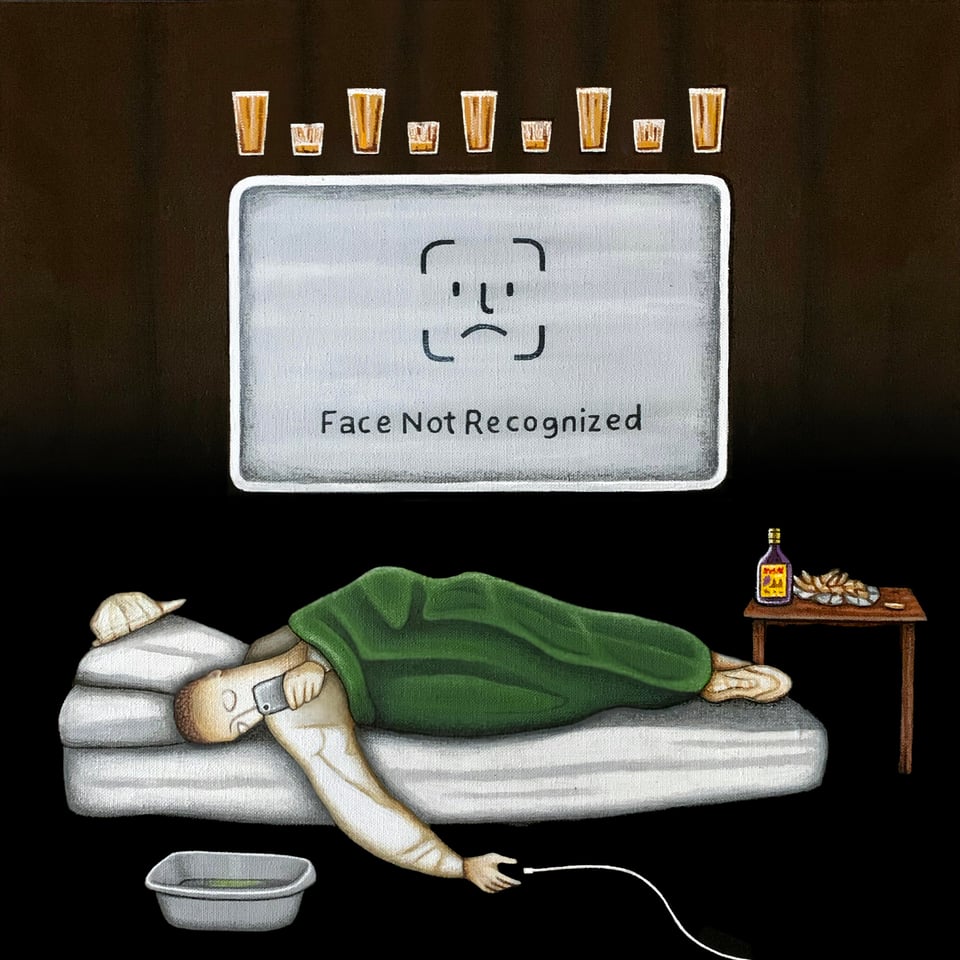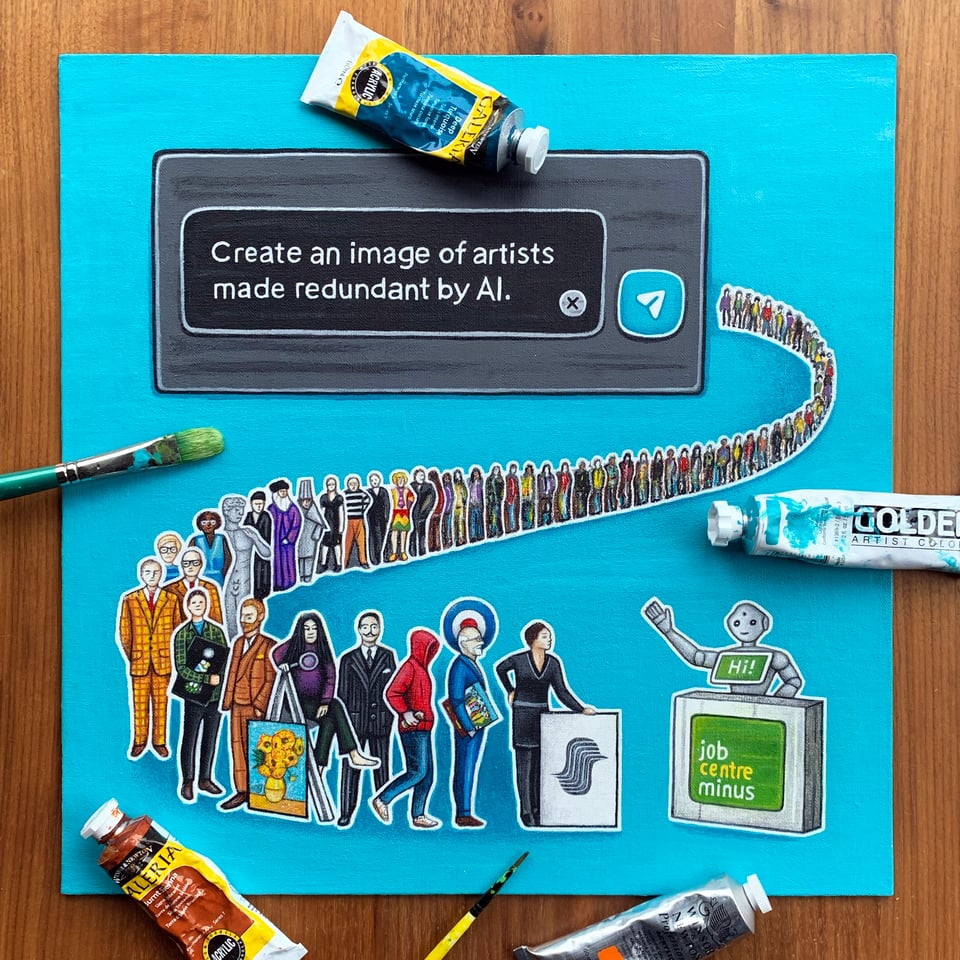How an artist tackles AI
Something a bit different this week.
I’ve been writing this newsletter-or-is-it-a-blog for just over six months and I’ve frequently ended up spouting about the impact of technology on society, and in particular where AI fits in relation to that.
You’ve probably gathered by now that I sit on the sceptical side of the house. While I’m sure AI will fundamentally alter how many of us live, work and play, the right use cases, context, and guardrails still need to found.
In lots of instances these elements are far from a given, and there are many sets of monkey tennis yet to be played.
But rather than chuntering on relentlessly with a chip on my shoulder, I thought it’d be interesting to seek views from another perspective.
Meet Ashley.
Who is Ashley?
Ashley Rawson is a Glasgow-based artist who works in a variety of mediums. You can view a selection of his work on his website or Insta, but he’s most well known for Glasgow Kiss, an artwork that explores the sectarian divide that still runs deep through Glasgow’s great footballing rivalry.

He’s also been my friend for the best part of forty years – we went to school together, drank cider in parks together, left our home city for university at exactly the same time, and despite living in separate cities since the mid-90s have stayed close.
I love him not only because he can cut me down to size, with great humour, in seconds flat but also due to the profound depth and familiarity a long-term friendship brings.
An unexpected bonus in producing this post has been reading the answers he sent me. I sort of knew where he was going to go with parts of it, but some of the responses were both surprising and delightful.
When do you ever sit down with an old friend and ask them a specific bunch of questions?
Why am I writing a post about this?
Our output has been converging in recent times. As I've been starting to express my views in writing, Ashley's been creating artworks that respond to the tech-dominated world around us.
I thought it would be fascinating to send him a series of questions, the sort of things I frequently end up asking myself, and see what happened.
Q: How would you describe your own relationship with technology?
Well… it’s a double-edged sword and at times I fear the negative edge is sharper than the positive one.
In recent years I’ve increasingly experienced technology through older members of my family who can struggle with the burden it places on later life.
From Morrisons’ self-checkouts and the removal of staff, through to everything related to day-to-day life management being directed to online chatbots, there’s a real bias towards relative youth and an open playing field full of rich pickings for scammers.
How does an isolated elderly person talk to an actual human being in a physical setting to confirm that the text message they got from their bank is authentic?
On the flip side, my mum is loving QR Codes (she can’t stop scanning them) and I’ve just designed a whole project (Football’s Square Mile) where the signage scheme is based on QR Codes at key locations.
Q: On that same topic, how has the use of technology impacted your work?
Technology has indirectly caused me copyright headaches and even a loss of income.
On several occasions I’ve discovered that individuals have taken an image of one of my paintings from the web, produced multiple copies, and sold them on. I even had a situation where a gallery did this and was selling large box canvases of my work with a fake signature: a stressful time!
I can’t help thinking that technology only really helps those that have the capacity to be ‘in the know’ and keep up. Those of us that live on technology platforms are usually blissfully unaware of individuals who experience technology as a barrier rather than an aid.

Digital evangelists tend to talk to an already converted flock and their only solution to greater access for groups that struggle with technology tends to be… “Let’s make a new digital solution to make it ‘easy’ for them!”
This is definitely evidenced by my experience in the workplace where physical, traditional, belt-and-braces solutions are often ignored because they aren’t ‘shiny’ or part of an all-things-digital strategic direction, which I’ve witnessed first hand and seen waste huge amounts of effort and money.
As an individual I am blessed that I, like you, am at an age where I’ve managed to get to grips with tools and tech. So personally I maybe have a largely positive direct experience of technology.
On an average day I will probably use: Canvas (lecturing), Slack (communication), Instagram (promoting my art), Adobe suite (design, animation etc).
All artists use technology. I've often used photographic references to help develop my artwork. For example, I might need to reference a human, creature, or plant. In the absence of having a model stand in a frozen position for hours (like artists did before photography) reference images can be incredibly useful.
The key for me is that references are just that: they act as one of many influences that help shape a final piece within the creative process.
When I’ve finished an analogue piece (mostly acrylic on canvas) technology takes over: scanning the original, getting print files spot on in Photoshop, setting up and scaling prints in InDesign, exporting print ready pdfs, preparing social posts in Photoshop and After Effects, promotion on Instagram, adding it to my website, receiving payments through Stripe and PayPal.
My original paintings would largely remain unknown and in a drawer if it wasn’t for technology. But I still produce original paintings using canvas, pencils, paint using my own hands and creative concepts.
I have no intention or interest in outsourcing the cornerstone of my analogue creative work to an AI art platform.
Q: It's interesting to me how much Glasgow Kiss repeatedly pops up on Facebook every time Celtic play Rangers. Where do you stand on social media?
My relationship with social media is love-hate. I enjoy producing content and often feel that a post about my art can enhance a piece, show the creative process, and bring more insight.
I’ve produced animations and films that can add more meaning and help me develop my software skills. I like that social has an element of trial and error where I must develop a sense of what works and what doesn’t.
On the downside, social has impacted my mental health to some degree. About a year ago I’d built up a decent following on Instagram with a ‘cool’ looking follow-to-follower ratio (about 300 following to 4k followers: it’s all about that apparently, so decree the digital gods).
I really felt that I was getting somewhere with consistent growth, like counts and resulting sales. I then got hacked and was offered very little support from Meta other than bot-responses. I felt absolutely gutted: all that time and effort wasted. Is social a con? Where’s the customer care a traditional company might offer?
Does the algorithm even work for content producers anymore? Much of the content I see on Instagram nowadays is paid for and promoted like old-style billboard advertising. 'Normal' creators seem to be becoming drowned out by those with money.
I’ve been fortunate that most social comments on my art have been positive but occasionally someone says something critical (fine) or abusive (not fine).
It’s probably the sort of person I am but one nasty comment can sear into the soul of a sensitive creative creature who will forget the 100 nice comments!
The impact this negative aspect has on young people who are just developing their confidence and sense of self must be awful.
Q: You and I have been discussing AI in a slightly jokey way for the last couple of years, at what point did you start to consider the more serious side of it?
Until recently it was very peripheral mostly through dubious/hilarious posts from one of our mutual friends.
I don’t do too much writing myself, so I hadn’t really delved into AI text enhancement with ChatGPT. LinkedIn was the first place that really got me worried. Towards the end of last year, I started seeing posts from artists I was connected to… but there was something different: AI.
Some artists were flooding LinkedIn with regular posts featuring AI-generated work, advice on what platforms were best and what prompts to use (prompts themselves are an artform now?).
More concerning, to me at least, is that these posts were getting traction. It was almost as if an AI painting of a renaissance angel that took seconds to generate and no thought whatsoever lifted the person who typed the prompt to the level of Raphael himself.
For me the crux of the issue is the lack of conceptual thought, big ideas, creative process, or challenge to the world. Instead, they reduced art down to ‘draw me a picture of: fill in blank’.
If these sort of posts continue to gain attention and people who commission art and design take them seriously and commit budget to AI art generation rather than art and design commissions from real people we’re in a bad place.
I suppose we’ve always had stock-image websites (Shutterstock, Alamy etc must be panicking) but at least these stock behemoths paid photographers and artists, however poorly, to feed the machine.
Q: Your day job as a lecturer means you're coming into contact with young people whose entire careers (and lives) will be very different to our own, due to AI and technology. Is there any specific advice you give them when it comes to their own creative influences and output?
My main message to students is to be authentic to yourself and ensure your work is just that: your work.
Thinly disguised copies, direct lifts, or AI-generated final pieces claiming to be original art are a no-no. Moreover, the study of any subject should surely be a journey of self-discovery where individuals grow in confidence and develop the ability to share ideas and communicate their thoughts.
If human thought, and craft, becomes the job of AI, where will we be, and how will individuals develop a strong sense of self?
I believe we all have an inbuilt desire to create. Whether it's writing or artwork, it’s all about justifying our existence, desiring attention from someone to tell us ‘That’s cool’, and for our peers to think we’re doing ‘OK’.
Isn’t that what all social media is built on: the desire to be ‘liked' and ‘loved’? And there’s nothing wrong with that. But personally if I’m going to engage in the world of social media and content generation I want to earn my own likes, not present something AI has done and pretend it’s mine.
As I mentioned above, artists have used visual references since the beginning of time. I’m not against AI as part of the creative process.
For example, back in Victorian times art schools would go to great effort and expense to amass a collection of plaster casts from antiquity/the Mediaeval era (Glasgow School of Art used to have a fantastic collection of these before the fire, or if you want to be blown away look at the V&A cast courts).
These weren’t for decoration: they were visual aids for the students, a study aid to sketch, a key contributory part of the creative and academic study process.
Today I believe there’s a place for AI within the creative process and in some ways these plaster casts were the AI of their time.
One buzz phrase being banded around in education now, is ‘AI co-piloting’. Within this we can imagine that a student could generate reference images with AI that could be part of the ingredient list that aids the creative process (just as a cast of old would be).
If a student clearly documents how they co-piloted with AI within the creative process, but can reach clear, independent conceptual artwork conclusions of their own I am fine with that. It’s simply a current example of humans using what contemporary references exist in the world around them to develop creativity and culture.

Q: We both grew up in the west coast of Scotland, do you think there's anything in the so-called Scottish work ethic that makes us more reactionary? I don't think John Knox would approve of boiling a creative process down to a prompt.
John would not be pleased!
In all honesty I can’t say I witnessed much of a Scottish work ethic growing up. I think by the time we grew up in post-industrial Glasgow, at a time of endless teacher strikes and "Maggie, Maggie, Maggie, Out, Out, Out", it might have been long gone.
My own work ethic though is mainly defined by the fact that I simply enjoy what I do (I’m probably heading for the fiery pit) but I do think artists should graft and love the process of it.
I alluded to this earlier but I believe AI prompts are a dark path in many cases. One of the joys of being a creative person is "The Creative Process". You mentioned this in a previous post and I 100% agree. My fear is that there is little-to-no creative process and limited thought in AI image generation.
Here's an example of how my own concepts come to life:
Idea:
I had a loose idea for a painting last year which I subsequently called Virgin Mobile.
Creative process stage 1:
I had the idea while sitting at a church service. The church is a belter (St Margaret’s Newlands: a Victorian Romanesque stunner with beautiful glass, mosaics and statuary).
It’s clear that the architect pulled out all the stops in church design, giving humans a sense that there might be a heaven as they take in all the visual stimulus.
Regardless, I was sitting there thinking ‘when can I check my Instagram’. As I left I observed a good portion of the congregation fumbling to turn on their phones and get plugged back into the mainframe.
It struck me that ‘Read your bible pray every day and you’ll grow, grow, grow’ (as the Sunday School song goes) has been replaced by ‘read your socials, post every day and you’ll grow, grow, grow’. This was the initial seed of an idea.
Creative process, multiple stages:
Over the next 3 months I worked on a painting. I didn’t have a title. I just knew I wanted to do a piece that presented digital obsession as the new religion and the phone as the new bible.
I went through countless little ideas in my head. These ideas popped up at unexpected moments and had unexpected triggers: I was a human thinking creatively. I decided to paint over and re-draft portions of the canvas because I had sharper ideas as it developed.
This process resulted in one of my favourite pieces. Had I left the church and entered an AI prompt into a phone I wouldn’t have the considered, thought provoking, well executed painting that I now have, and it wouldn’t (in my opinion) be worthy of the term ‘art’.
I know it's weird but I think the thing that drives my work is a kind of creative fever. The passion for completing a piece of art can be all consuming, fuelling the creative process. People might say ‘you worked really hard on that’ but in my view I was just having fun and enjoying life!
Q: I know I particularly loathe hustle culture and the sense you can get ahead/rich/famous at minimum effort (which permeates the videos my kids watch on YouTube). Where do you stand on that?
I’m all for the kids taking shortcuts to get rich quick. The nice thing about getting older is accepting that the kids always win in the end.
They push things forward (hopefully) and change perceptions. My world view, and my voice, is getting weaker by the day as they get bigger, stronger, and louder.
That’s OK as long as the ship is steering in the right direction. You mentioned Nazism and Substack in a previous post… I’d rather have terribly produced AI-generated YouTube videos about a Dirty Bulk to Cut than polished right wing newsletters.
I stick to my guns on art and true creativity though. An AI video with sampled everything is what it is and if it gets a gazillion likes, so be it.
However if it wins a BAFTA we have a problem. Art, creative writing, and a sense of what is true culture and human expression should somehow be defined and ringfenced (but I don’t know how or by whom: getting into cultural dictatorship territory!).
One interesting point relating to this question is that I’m not necessarily sure the kids are engaging in hustle/get rich with minimal effort activity. Part of me has to give them credit for utilising the theory of Connectivism even if they don’t realise they are!
In the digital world maybe success for humans isn’t about specialising in a trade. Instead it’s about knowing what the very latest digital gizmo is that can do the trade for you: Press the button and monetise! Then stay ahead of the game and press the button on the next one!
Q: Your recent artwork doesn't just focus on AI, it touches on the impact of technology on lots of areas of modern life. What's been the inspiration for that?
Following on from Virgin Mobile, which was essentially a painting of a digital addicted biblical mother and a child, I began to think: what are they actually looking at? How will it affect their lives?

I decided I wanted to dive into the actual screen and investigate the common phrases that existed on the phone that had replaced the Virgin Mobile Bible. I quickly realised that I too was living with these common phrases that would have meant nothing to me only a decade ago:
"Your face is not recognised"
"Your screen time was down 25% last week" (I wish 🤣)
I used these phrases as springboards for artwork that linked in with other non-digital aspects of my life: alcohol, fear of mortality, etc
In addition, I wanted to do a piece which punched back at AI generated prompts and imagery. For me the best way to do this was to give myself a prompt and to reverse the whole transaction by doing a real painting that would take a week rather than seconds. I decided on the prompt:
"Generate an image of artists made redundant by AI"

I then did a painting of unemployed artists being greeted by a Bot at their local Job Centre. I included a little illustration of myself in the queue chatting to Van Gogh and Yoko Ono (how I laughed).
The reason for all of this: it’s cathartic, makes a statement, and adds to the debate.
I decided long ago that I wasn’t part of any prevailing art movement. I’m not an abstract, mark making, ‘interpret it yourself’ artist. I’m an artist that wants to make clear statements that most people will understand and decide to accept/reject, or have an opinion on.
The paintings, and more recently poems, about technology and digital are not intended to be commercial (as many of my other pieces are). Rather they are intended to be my way of having a voice in part of a broader debate.
I felt now in 2024 was the right time to express that voice on these issues… Especially after seeing all that AI-generated art.
So there you go: some thoughts on creativity, technology and the state of the world, all in response to a few prompts.
Maybe it would have worked better as a podcast? But that's getting into dangerous territory.
🎨 Thank you for reading.
-
Really blown away by this, Hugh! So well executed!! Great to hear Ashley speaking of how AI affects the artistic process and you giving him the opportunity to express and explain his views.
I will subscribe to your newsletter as I'm bound to learn lots from it. Will now attempt to read some of your back newsletters.......
Add a comment: